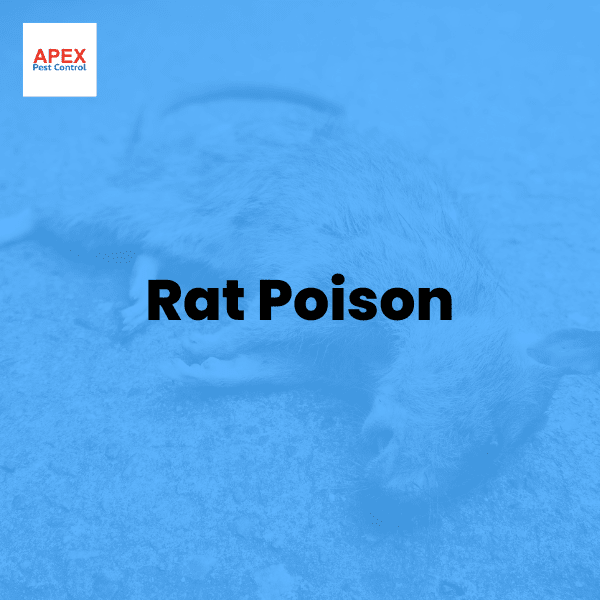Effective Rat Poison: The Key To Successful Pest Control
At Apex Pest Control, we understand the importance of effective rodent management. This comprehensive guide will explore rat poison, its types, proper usage, and alternatives to help you make informed decisions about pest control.
Explore our comprehensive guide on Rat Infestation Signs, highlighting key indicators of rodent presence and offering crucial insights to help safeguard your home and health.
Definition of Rat Poison
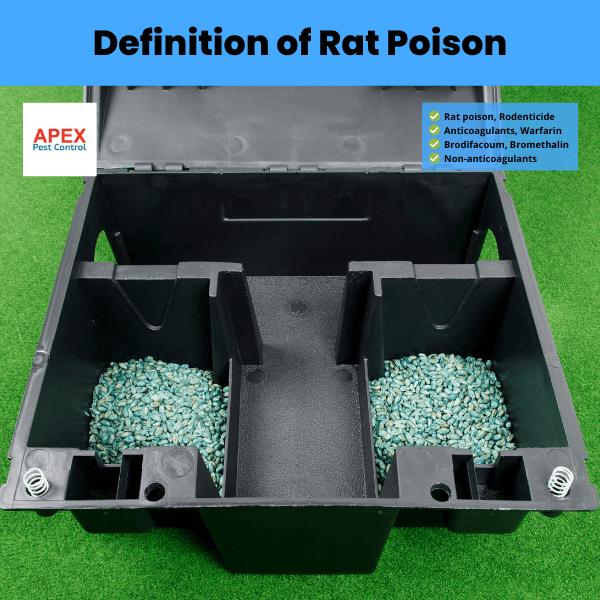
Rat poison, also known as rodenticide, is a substance specifically designed to eliminate rats and other rodents. These pest control products are crucial in managing rodent populations in various settings, from residential homes to commercial properties.
Types of Rodenticides
1. Anticoagulants
- First-generation (e.g., Warfarin)
- Second-generation (e.g., Brodifacoum)
2. Non-anticoagulants
- Bromethalin (affects the nervous system)
- Cholecalciferol (raises calcium levels)
3. Acute toxicity rodenticides
- Zinc phosphide
- Strychnine (restricted use)
How Rat Poison Works
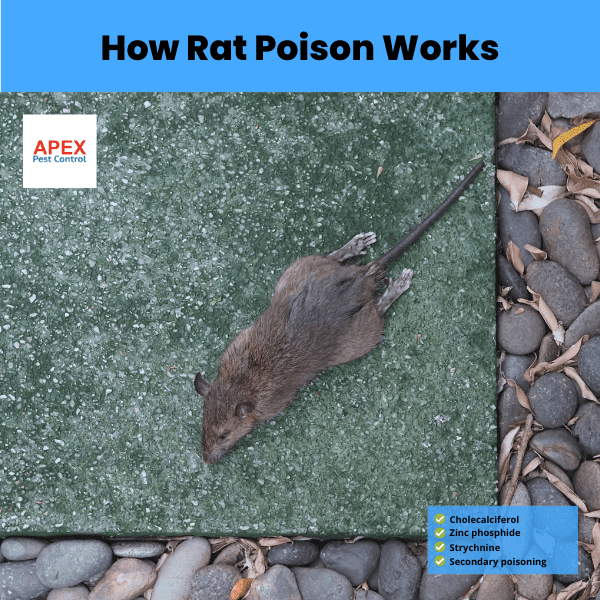
The effectiveness of rat poison lies in its ability to interfere with essential bodily functions, leading to the rodent’s demise. The exact mechanism varies depending on the type of rodenticide used.
Anticoagulant Rodenticides
These poisons disrupt the blood clotting process, causing internal haemorrhages over time. They’re often preferred due to their delayed action, which prevents bait shyness.
Non-anticoagulant Rodenticides
- Bromethalin: Causes cerebral oedema and seizures
- Cholecalciferol: Leads to hypercalcemia, resulting in organ damage
Acute Toxicity Rodenticides
These fast-acting poisons cause rapid death, usually within hours of ingestion. However, they may induce bait shyness if sub-lethal doses are consumed.
Uses of Rat Poison
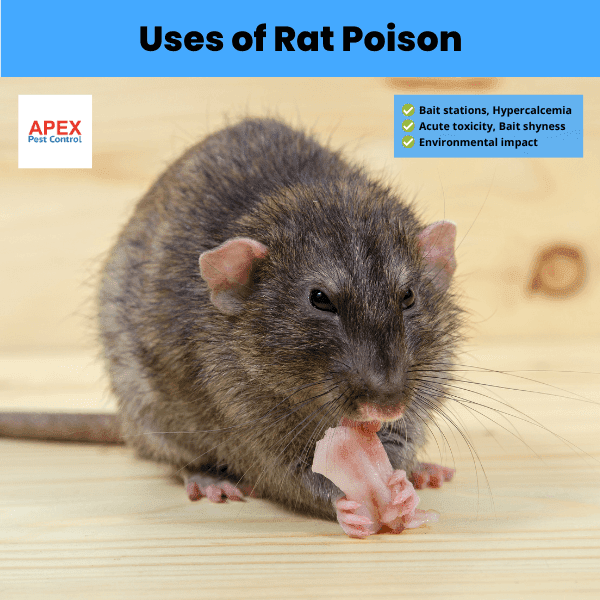
Rat poison is commonly employed in various settings to maintain hygiene and prevent disease transmission:
- Residential properties
- Commercial buildings
- Agricultural facilities
- Urban environments
Integrated Pest Management (IPM)
At Apex Pest Control, we advocate for an IPM approach, which combines chemical control methods with other strategies for comprehensive rodent management.
How To Use Rat Poison Safely
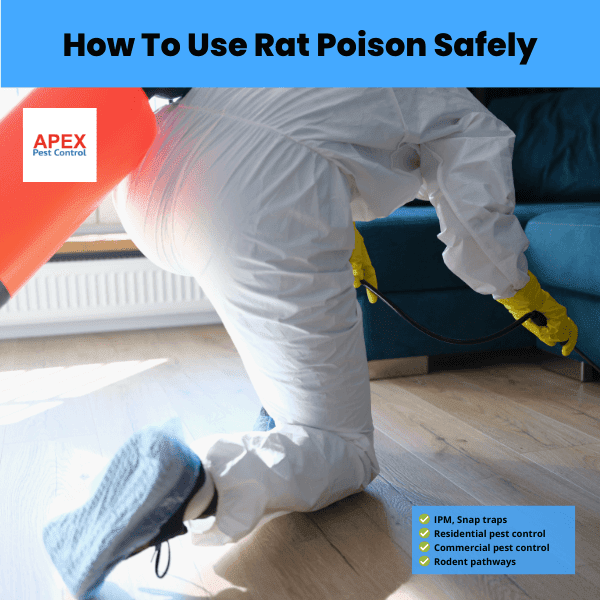
Proper application of rat poison is crucial for its effectiveness and safety. Follow these guidelines:
- Conduct a thorough inspection to identify rodent activity areas
- Choose appropriate bait stations to prevent access by non-target animals
- Place bait stations in strategic locations along rodent pathways
- Monitor and replenish bait regularly
- Properly dispose of dead rodents and contaminated materials
Bait Station Placement
- Along walls and corners
- Near entry points
- In attics and crawl spaces
- Around exterior perimeters
Risks and Dangers of Rat Poison
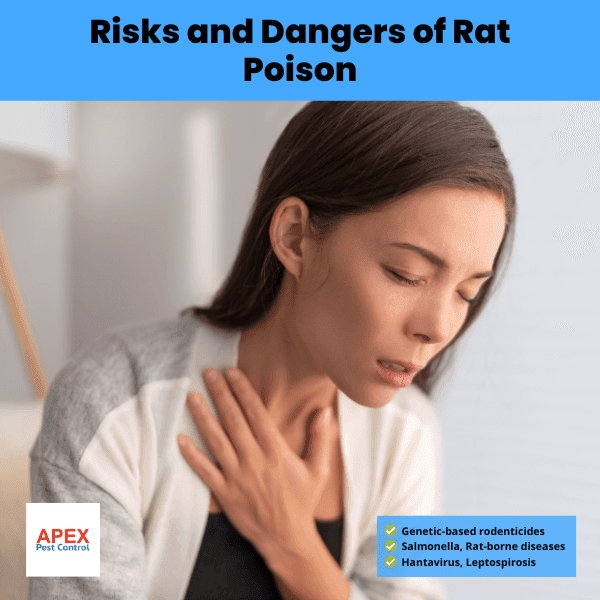
While effective, rat poison poses several risks that must be considered:
Potential Harm To Non-target Animals
Secondary poisoning can occur when predators consume poisoned rodents. This risk extends to pets and wildlife.
Risks To Humans, Especially Children
Accidental ingestion by children is a serious concern due to their curiosity and the often-attractive appearance of baits.
Environmental Impact
Rodenticides can contaminate soil and water sources, affecting ecosystems beyond the target area.
Safe Handling and Storage of Rat Poison
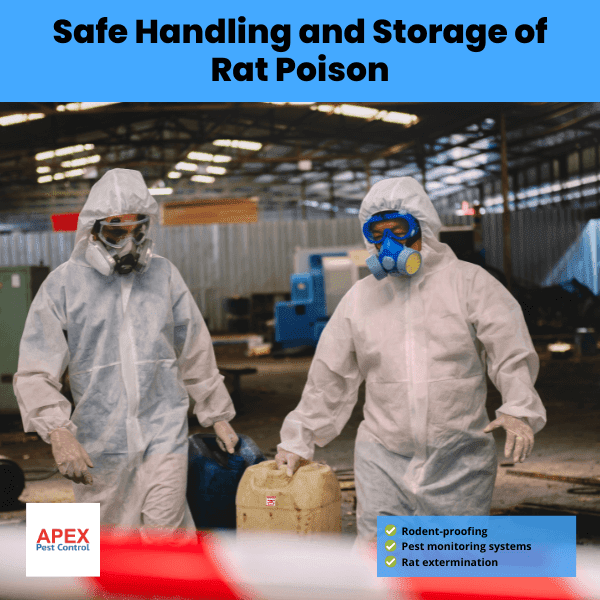
Proper Storage Methods
- Store in original, clearly labelled containers
- Keep in locked cabinets out of reach of children and pets
- Maintain in a cool, dry place away from food items
Safety Measures When Handling Rat Poison
- Wear protective gloves
- Avoid inhalation of dust or vapours
- Wash hands thoroughly after handling
Use tools dedicated to bait handling to prevent cross-contamination
Alternatives to Rat Poison
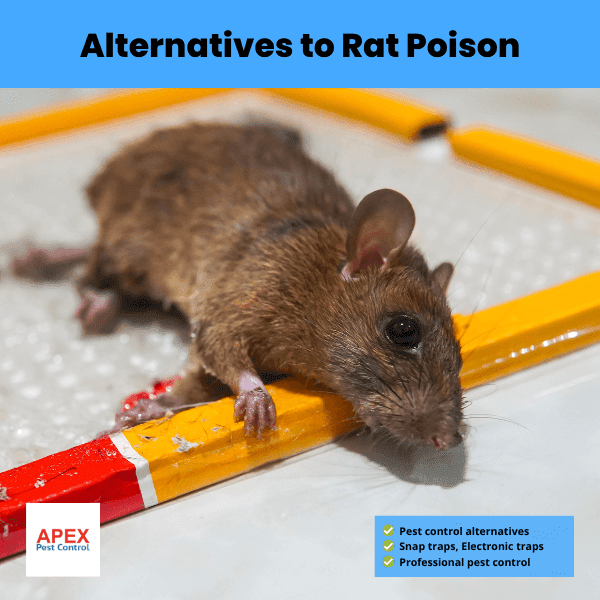
At Apex Pest Control, we offer a range of alternatives for those seeking non-toxic rodent control options:
Natural Alternatives
- Peppermint oil repellents
- Ultrasonic devices
- Predator urine (e.g., fox or coyote)
Mechanical Alternatives
- Snap traps
- Live-catch traps
- Electronic traps
Professional Pest Control Services
Our expert technicians at Apex Pest Control provide comprehensive rodent management solutions tailored to your specific needs.
Legal Regulations Surrounding Rat Poison
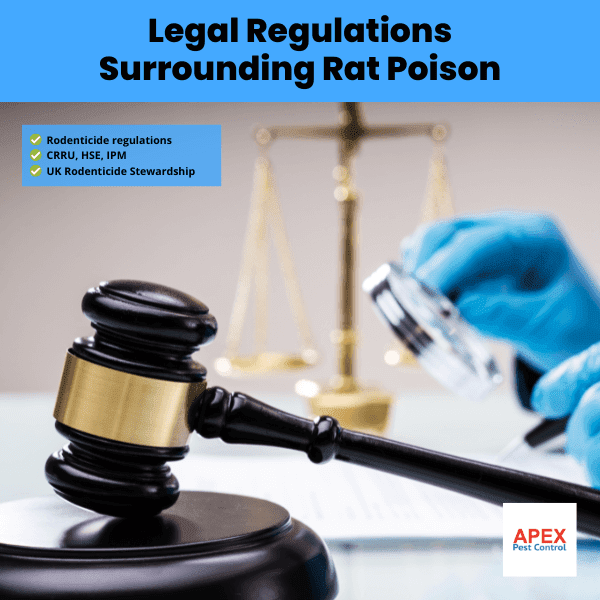
Laws and Regulations in Different Regions
Here is a list of key laws and regulations regarding rat poison in the UK:
- The use of rodenticides in the UK is regulated by the Health and Safety Executive (HSE) under the Control of Pesticides Regulations 1986.
- Only rodenticide products approved by HSE can be legally used, and they must be used in accordance with their conditions of authorization.
- The UK Rodenticide Stewardship Regime, overseen by the Campaign for Responsible Rodenticide Use (CRRU), governs the use of second generation anticoagulant rodenticides (SGARs).
- From July 2016, anyone purchasing professional rodenticide products for professional use must have proof of competence, such as certification from an approved training course.
- Non-professional users are restricted to purchasing rodenticides with no more than 0.003% active substance, in packs no larger than 300g for block baits or 150g for other formulations.
- Outdoor use of rodenticides containing bromadiolone and difenacoum will be illegal from July 4, 2024, except for use immediately around buildings.
- The Environmental Protection Act 1990 requires users to dispose of dead rodents and unused bait safely and responsibly.
- The Wildlife and Countryside Act 1981 makes it an offence to kill or take certain wild animals, including some rodent species, without a licence.
This list is based on information from the HSE, CRRU UK, and recent legislative updates. It’s important to note that regulations can change, so it’s advisable to check the latest guidance.
Rodenticide use is regulated by various agencies, including the EPA in the United States. Always check local regulations before using rat poison.
Consequences of Misuse or Illegal Use
Improper use of rodenticides can result in fines, legal action, and environmental damage.
Case Studies on Rat Poison Use
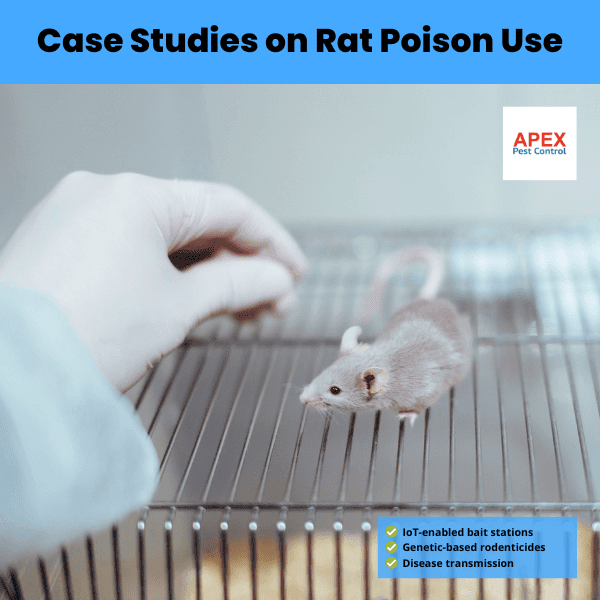
Successful Uses of Rat Poison
When used correctly as part of an IPM strategy, rat poison has effectively controlled rodent populations in various settings, from urban environments to agricultural areas.
Instances Where Rat Poison Caused Harm or Damage
Unfortunately, there have been cases of non-target animals, including pets and wildlife, being affected by rodenticides. These incidents underscore the importance of proper use and consideration of alternatives.
Steps To Take If Rat Poison Is Ingested
Immediate Actions To Take
If ingestion is suspected, do not induce vomiting unless instructed by a medical professional. Contact poison control immediately.
When To Seek Medical Help
Always seek immediate medical attention in cases of suspected poisoning, regardless of symptoms.
Emerging Trends in Rodent Control
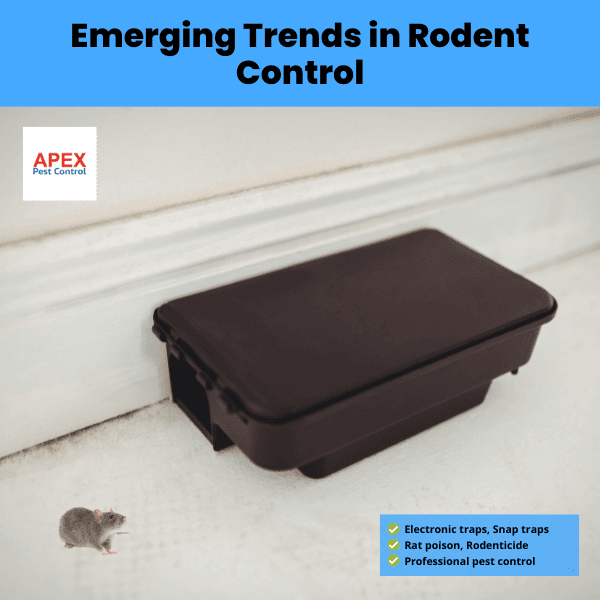
Smart Bait Stations
IoT-enabled devices now allow for real-time monitoring of rodent activity and bait consumption, enhancing the efficiency of control programmes.
Genetic-based Rodenticides
Research is ongoing into species-specific rodenticides that minimise risks to non-target animals.
Final Thoughts On Rat Poison
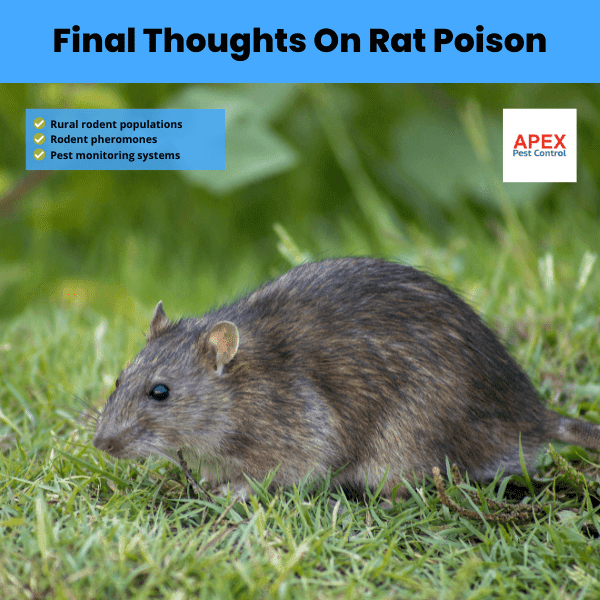
While rat poison can be an effective tool in rodent control, it’s crucial to consider all aspects of its use, including potential risks and alternatives. At Apex Pest Control, we’re committed to providing safe, effective, and responsible pest management solutions.
Recap of the Information Presented
We’ve covered the types of rat poisons, their mechanisms, proper usage, risks, and alternatives. Understanding these aspects is key to making informed decisions about rodent control.
Encouragement for Safe and Responsible Use
If you choose to use rat poison, always prioritise safety and follow guidelines meticulously. Consider professional pest control services for comprehensive and responsible rodent management.
Frequently Asked Questions
Can humans get sick from touching rat poison?
Yes, especially if you touch your mouth or food afterward. Always wash hands thoroughly after handling.
What happens if a dog eats rat poison?
It can cause severe health problems or even death. Contact a veterinarian immediately if ingestion is suspected.
How long does rat poison take to kill rats?
Depending on the type, it can take between 1-2 days or up to 1 week for the poison to be lethal.
Are there laws against using rat poison?
Yes, many regions have regulations controlling its use. Misuse may lead to legal consequences.
What are some alternatives to rat poison?
Alternatives include natural repellents, traps, and professional pest control services like those offered by Apex Pest Control.
At Apex Pest Control, we’re here to help you navigate the complexities of rodent control. For expert advice and professional pest management services in South Yorkshire, don’t hesitate to contact us. Let’s work together to create a safe, pest-free environment for you and your family.

Tony Johnson, Founder & Lead Technician at Apex Pest Control, is a BPCA and NPTA accredited pest management expert with over 35 years’ hands-on experience. Tony specialises in Integrated Pest Management and ensures all services comply with UK pest legislation, including the Wildlife and Countryside Act 1981 and COSHH Regulations 2002. His commitment to continual learning and adapting to industry best practices means clients receive effective, safe solutions for pests affecting homes and businesses across South Yorkshire. Tony’s dedication to professional standards, ethical treatment methods, and local expertise has made him a trusted partner for pest control and prevention.
-
BPCA & NPTA accredited | CHAS certified
-
Committed to UK pest law compliance & safety
-
Focused on effective, ethical pest management for South Yorkshire

